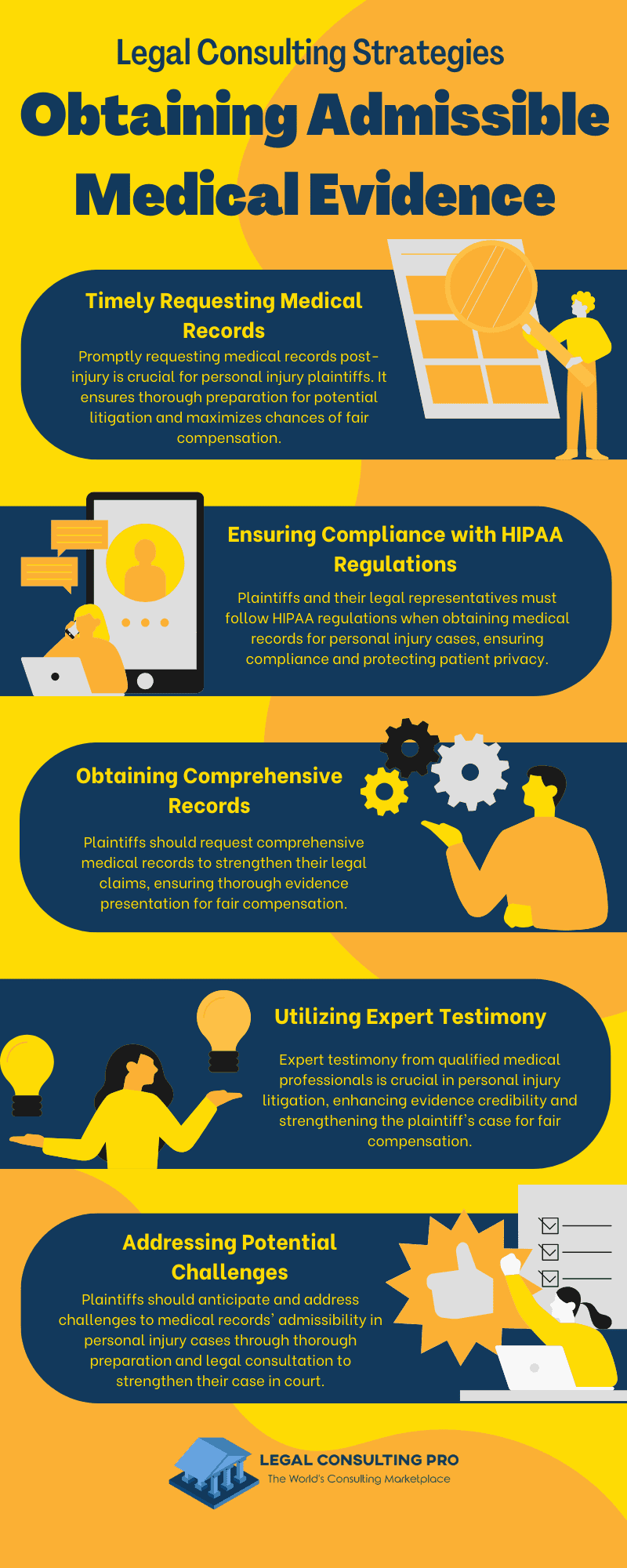Medical records serve as a cornerstone of evidence in personal injury claims, providing critical documentation of the plaintiff’s injuries, medical treatments, and prognosis. They offer objective and comprehensive insight into the nature and extent of the injuries sustained, helping to establish liability and calculate damages. However, for medical records to be effective in litigation, they must meet certain criteria for admissibility and relevance. This involves ensuring that the records are authentic, accurate, and directly related to the plaintiff’s injuries and legal consulting claims.
By obtaining admissible medical evidence and effectively utilizing it in court, plaintiffs can strengthen their case and increase the likelihood of obtaining fair compensation for their injuries. Therefore, understanding the importance of medical records and employing strategies to ensure their admissibility and relevance are essential steps in pursuing a successful personal injury claim.
Understanding the Role of Medical Records in Personal Injury Claims
Medical records are essential evidence in personal injury claims, documenting the nature, extent, and treatment of the plaintiff’s injuries. They serve as a factual basis for establishing liability and calculating damages. By detailing the injuries sustained and the medical treatments received, these records provide objective documentation of the plaintiff’s damages.
They also offer insights into the prognosis for recovery, aiding in the assessment of future medical expenses and loss of earning capacity. Moreover, medical records corroborate the plaintiff’s account of the incident, bolstering their credibility and strengthening their claims. In cases where liability is disputed, medical records provide persuasive evidence that supports the plaintiff’s version of events.
Therefore, ensuring the admissibility and relevance of medical records is crucial for the success of personal injury claims. By utilizing medical records effectively, plaintiffs can maximize their chances of securing fair compensation for their injuries and holding negligent parties accountable.
Admissibility of Medical Records
The admissibility of medical records refers to whether these records meet the legal consulting requirements to be accepted as evidence in court proceedings. Admissible evidence is information that the court permits to be presented to the judge or jury to consider when deciding a case. In the context of personal injury litigation, medical records must meet specific criteria to be deemed admissible relevance, authenticity, reliability, etc.
Ensuring the admissibility of medical records is paramount for their effectiveness as evidence in personal injury litigation. These records must meet specific criteria, including relevance, authenticity, and reliability, to be considered admissible by the court. Typically, courts require medical records to be authenticated by a qualified medical professional and demonstrate relevance to the plaintiff’s injuries and the underlying legal consulting claims. By adhering to these standards, plaintiffs can enhance the credibility and persuasiveness of their medical evidence, thereby strengthening their case and maximizing their chances of obtaining fair compensation for their injuries. Therefore, meticulous attention to the admissibility requirements of medical records is crucial for success in personal injury litigation.
Legal Consulting Strategies for Obtaining Admissible Medical Evidence
- Timely Requesting Medical Records: Plaintiffs should promptly request their medical records post-injury. Timely acquisition allows thorough review, analysis, and preparation for potential litigation. Obtaining records promptly ensures sufficient time to assess injuries, understand medical history, and gather crucial evidence to support legal consulting claims. This proactive approach demonstrates a commitment to pursuing legal consulting rights and strengthens negotiating positions or court proceedings. Therefore, prompt request and acquisition of medical records are essential steps for plaintiffs in personal injury cases to protect their interests and maximize their chances of obtaining fair compensation.
- Ensuring Compliance with HIPAA Regulations: Plaintiffs and their legal consulting representatives must comply with the Health Insurance Portability and Accountability Act (HIPAA) regulations when obtaining medical records. HIPAA mandates that patients authorize the release of their medical records to authorized individuals or entities. This authorization ensures patient privacy and confidentiality while allowing for the lawful access and use of medical information in legal consulting proceedings. Therefore, plaintiffs and their representatives must obtain the necessary HIPAA authorization from the patient before accessing their medical records for use in personal injury litigation. This ensures compliance with regulatory requirements and protects patient privacy rights throughout the legal consulting process.
- Obtaining Comprehensive Records: Plaintiffs should request comprehensive medical records covering all relevant aspects of their treatment, including diagnostic tests, surgeries, rehabilitation, and follow-up care related to their injuries. Comprehensive records offer a detailed account of the plaintiff’s medical history and treatment course, enhancing the strength of their case. By ensuring that all relevant medical information is documented, plaintiffs can provide a comprehensive overview of their injuries and medical treatment, which is crucial for supporting their legal consulting claims. This proactive approach enables plaintiffs to present a compelling case supported by thorough and accurate medical evidence, increasing their chances of obtaining fair compensation for their injuries.
- Utilizing Expert Testimony: Expert testimony from qualified medical professionals is invaluable in personal injury litigation, as it can authenticate medical records and elucidate complex medical issues for the court. These experts offer valuable insights into the plaintiff’s injuries, treatment, and long-term prognosis, bolstering the credibility of medical evidence presented in court. By providing expert analysis and interpretation of medical records, these professionals help the court understand the extent and impact of the plaintiff’s injuries, as well as the effectiveness of their treatment. This enhances the persuasiveness of the plaintiff’s case and strengthens their position in seeking fair compensation for their injuries. Therefore, expert testimony from medical professionals is a crucial component of presenting a compelling case in personal injury litigation.
- Addressing Potential Challenges: Plaintiffs must anticipate and address potential challenges to the admissibility of medical records in personal injury litigation. Common challenges include hearsay objections, lack of foundation, and authenticity issues. Thorough preparation and consultation with legal consulting experts are essential to mitigate these challenges and ensure the admissibility of medical evidence. Plaintiffs should carefully authenticate medical records, ensuring they meet relevant legal consulting standards. Additionally, they should anticipate objections and be prepared to provide supporting evidence or testimony to overcome them. By proactively addressing potential challenges, plaintiffs can strengthen their case and increase the likelihood of successfully admitting medical evidence in court.

Effective Utilization of Medical Records in Personal Injury Claims
Once obtained, medical records should be carefully reviewed, organized, and analyzed to identify key evidence supporting the plaintiff’s claims. Effective utilization of medical records involves:
- Establishing Causation: Medical records should demonstrate a clear link between the defendant’s negligent actions or wrongdoing and the plaintiff’s injuries. Physicians’ diagnoses, treatment notes, and expert opinions can help establish causation by linking the plaintiff’s injuries to the incident in question.
- Documenting Damages: Medical records serve as a basis for calculating economic and non-economic damages in personal injury claims. Detailed medical bills, treatment records, and physicians’ assessments of the plaintiff’s injuries are essential for accurately quantifying damages related to medical expenses, lost wages, pain and suffering, and future medical needs.
- Presenting Compelling Evidence: Medical records should be presented in a clear, organized manner to effectively convey the severity and impact of the plaintiff’s injuries to the court. Visual aids, such as medical diagrams or illustrations, can help jurors understand complex medical issues and empathize with the plaintiff’s suffering.
- Rebutting Defense Arguments: Medical records can be used to refute defense arguments challenging the severity or causation of the plaintiff’s injuries. Comprehensive medical documentation and expert testimony can counter defense claims of pre-existing conditions, alternative causes of injury, or exaggeration of symptoms.
Conclusion
Medical records are indispensable evidence in personal injury claims, providing objective documentation of the plaintiff’s injuries, treatment, and prognosis. Ensuring the admissibility and relevance of medical records is essential to their effective utilization in personal injury litigation. By following best practices for obtaining, authenticating, and presenting medical evidence, plaintiffs can strengthen their claims, maximize compensation, and achieve favorable outcomes in personal injury cases.
Similar blogs:
Legal Consulting Anatomy of a Successful Personal Injury Case: Key Components and Strategies
Workplace Safety and Injury Prevention: Advancing the Case for Workers’ Compensation Lawyers







































